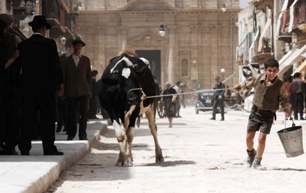Giuseppe Tornatore is known overwhelmingly for one international hit. There have been sundry other films from him in the 21 years since Cinema Paradiso won the Best Foreign Language Oscar, but none which have sold such a seductive vision of Italian village life. Though damned to backwardness, stymied by introspection, Tornatore’s evocation of Sicily in 1950s was awash with vitality and colour. In Baarìa he finally goes home. Could he have another bittersweet blockbuster on his hands?
It’s a very different film, despite a wholesale overlap in tone, provided not least by Ennio Morricone's reliably gloopy soundtrack. Cinema Paradiso was Tornatore’s apology for abandoning the island in pursuance of fame and success. Just in case you somehow missed it, it told a young boy, based somewhat on the writer-director himself, who learns to love the movies at the feet of a projectionist (played by Philippe Noiret) who insists he abandon his backwater to seek his fortune in Rome. This new love letter to the island is all about staying, and it feels like an atonement.
Tornatore’s script has a breathless addiction to comic-strip incident
Thus where Totò, the protagonist in the earlier film, finds professional fulfilment on the mainland but misses out on love, Peppino follows the opposite trajectory. He remains immersed in the life of the town which spawns him, from poverty-stricken isolation of the 1920s through to the heavily motorised 1980s. Peppino’s father is a farmhand, and his son (pictured below right) has no alternative but to abandon school, which he hates anyway, and follow him out into the parched Sicilian outback to tend sheep. There he dreams of a change of fortune, as symbolised by the three rocks to which a legend is attached – that anyone who can bounce a stone to hit all three in one throw will be rich.
 As Peppino grows, he grows wealthy in the slings and arrows of experience. The Fascists come, meting out comical cruelties, while in their wake the Mafia and complicit landowners spread furtive terror. Peppino enlists as a soldier and then as a communist whose postwar struggles are defined by the quest for social justice. Towards the quiescent end of a life in which he has given his career to political idealism, he is resigned to the melancholy truth that he can no more change Sicily than it can change him.
As Peppino grows, he grows wealthy in the slings and arrows of experience. The Fascists come, meting out comical cruelties, while in their wake the Mafia and complicit landowners spread furtive terror. Peppino enlists as a soldier and then as a communist whose postwar struggles are defined by the quest for social justice. Towards the quiescent end of a life in which he has given his career to political idealism, he is resigned to the melancholy truth that he can no more change Sicily than it can change him.
Such are the bare bones. The bigger picture – and at two hours and a half it is indeed big - delivers a potted history of Italy’s social and economic struggles, as seen through a teeming community of familiars - crocked relatives, corrupt officials, old men on street corners and long-suffering women of all ages. Plus an army of cute short-trousered ragazzini. And the film does work exceptionally hard to keep abreast of events. Often too hard. Tornatore’s script has a breathless addiction to comic-strip incident – to planes raining bombs, to crowds noisily massing in the streets, to babies popping relentlessly from wombs – which densely clutters his narrative.
Somewhere in there is an intimate epic about the ties that bind family and community. Peppino (Francesco Scianna) naturally falls for an impossibly beautiful blue-eyed girl (Margareth Madè), only for her parents to oppose the union. In one of many setpiece scenes played mainly for comedy, they elope not from the island but into her family home, where they barricade themselves in and consummate their union while all Baarìa clusters outside the bedroom windows. Only in Sicily. Or only in Tornatore’s Sicily, where young boys learn early that they must holler to be heard, where the capacity of joy and self-pity bubbles in local blood like the fruit sprouting in the groves.
Baarìa may be set in the director’s home town of Bagheria, rather than the inland village of Cinema Paradiso, but you know you’ve returned to the same milieu when little Peppino tears along the central street to buy cigarettes for an old man, his big eyes and nut-brown skin manipulatively evoking the young Salvatore Cascio who played Totò all those years ago. It’s no masterpiece. The actors age unconvincingly – Madè especially. Tornatore is guilty of wanting to cram in far too much to a film which feels almost like a suicide note.
Opening scene: Peppino runs along the street of Baarìa
But Baarìa heaves and swells with a love of life, with a mature understanding of its long unavoidable rhythms and accretions, of seasons and tastes which come and bafflingly go. As the adult Peppino, Scianna heals the wound that still festers from Cinema Paradiso: the moment when Totò grows up and Cascio vanishes from the film (in a Dickensianly vast cast, honourable mentions are also due to Giovanni Gambino and Davide Viviani as the younger versions of Peppino). If dry Nordic introspection is your bag, keep clear. Ditto if you don’t like seeing cows being slaughtered the old ritualistic way (and their blood drunk: the scene was filmed for legal reasons in Tunisia). For anyone else, this baggy mess of slapstick nostalgia, somewhere between a soap and an opera featuring, for the record, a wonderfully pointless nude cameo from Monica Bellucci, will leave you just a little bit awash.
Closing scene: the kissing montage in Cinema Paradiso














Add comment